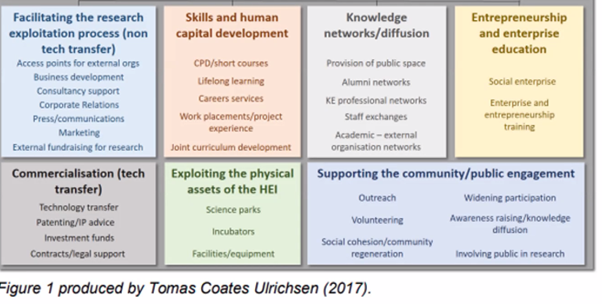Christina Blakey, Head of Knowledge Exchange Office, Edge Hill University

While Knowledge Exchange within the University sector in the UK is not exactly a new frontier, you’ll have seen in recent years an increase in the use of the term ‘knowledge exchange’ and a heightened focus on universities engaging with, and investing in, knowledge exchange in its own right. But what exactly is knowledge exchange?
So, in its simplest form knowledge exchange is any activity which brings together academia and organisations external to academia. It’s a process which endeavours to unlock the knowledge, expertise, and research of higher education institutions for the benefit of the world outside of universities.
It is an almost all-encompassing term which leads to knowledge exchange initiatives looking very different from institution to institution.
Some examples of Knowledge Exchange activities can include (but are not limited to)
- Collaborative research projects
- Consultancy services
- Commissioned/contract research
- Providing specialist University facilities, equipment, and testing services to companies
- Continuing professional development and training (CPD)
- Knowledge Transfer Partnerships (KTPs)
- IP exploitation
- Licensing technologies, tools, or training materials
- Briefings and other ways of communicating research
- Events with external audiences
- Secondment and placement positions
They will always include a partner, client, or stakeholder external to the university and successful knowledge exchange should be based on a mutual, collaborative approach to engagement and learning.

As the profile and the associated metrics (as we love a good league table or measurement tool in the university sector) increases, this will inevitably lead to a greater focus on the purpose of knowledge exchange and the fundamental question – does knowledge exchange really matter?
The economic impact of Universities in the UK has long since been a matter of public record. Just recently (September 2023), Universities UK published a report from London Economics highlighting that higher education makes a £116bn contribution to the UK economy – £130 billion including the spending of international students. Alongside this, many Universities conduct their own research into understanding their economic impact for their individual region. Edge Hill University published their latest figures on this in May 2022 highlighting that the university contributes a huge £175.9m to the economy and is the biggest employer in West Lancashire.
But is knowledge exchange just about income and economics? It’s true that many of the metrics within knowledge exchange focus on the income generated but universities are so much more than their financial profiles. As with many other institutions, Edge Hill University has a strong ethos for being an agent of change for social and public good. Universities are, after all, a charitable institution. This is where knowledge exchange comes in – it shines a light on activities which are outside of the core teaching and learning or research activities.
Now, I will hold my hands up to being biased on this topic as a knowledge exchange professional within the university sector. In my eyes, the world of knowledge exchange harnesses the best elements of academia – the flexible, creative, problem-solving skills of researchers and staff underpinned by academic curiosity. It utilises these skills to focus on challenges, problems and issues faced by sectors, businesses, and individuals within society. It can generate new ideas and create opportunities for new research, make teaching more relevant and improve teaching practise, and improve quality of life from creating jobs with industry to improving health outcomes.
There are some fantastic examples of true partnership working which has led to knowledge exchange making a real difference to people’s lives from the development of bacteria-resistant medical swabs (reducing the risk of transmission for health care workers), providing specialist training and development to first responders on understanding trauma, supporting local filmmakers and venues with the organisation of a film festival, and running a community radio station. All are examples of knowledge exchange, and all showcase the variation, flexibility, and creativity of working with a university. So, if you are facing a challenge and you don’t know where to turn, maybe consider reaching out to a university there is expertise on your doorstep, and we are here to support you to access it.
